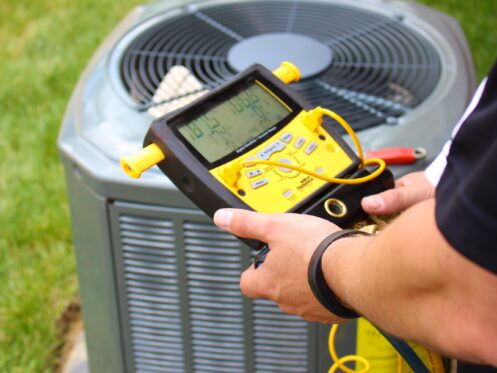No one wants to see their air conditioner decline in performance or even fail when summer hits its peak. Fortunately, you can reduce the odds of this happening with a bit of AC maintenance. Here is how you can keep your AC in top condition as summer warms up.
Regularly Handle DIY Tasks
We generally recommend that homeowners leave the HVAC work to our technicians. However, there are a couple of DIY tasks that you can easily do.
Checking and Replacing Filters
Filters keep particulate matter from getting into your AC. Keeping a clean filter in your AC improves efficiency by making sure that clean air can flow into the unit. Likewise, a clean air filter provides improved indoor air quality.
Many HVAC systems have multiple filters. This is particularly true if the system includes an indoor air quality system, such as an air purifier. Depending on the configuration, it might include a high-efficiency particulate air (HEPA) filter and perhaps an activated carbon filter.
You can read your HVAC manual to find out where these filters are and how to access them. Likewise, the manual will tell you the model numbers for the filters so you can purchase replacements.
Standard filters have a somewhat loose look, a bit like cotton candy. These filters usually require replacement once every three months. Your unit may also use filters like these as pre-filters for the more expensive HEPA and carbon filters. The high-end filters usually require replacement once every six to twelve months.
Bear in mind that replacement schedules can vary among households. Especially when you’re just getting to know a new HVAC system or house, you should check the filters once a month. Some households’ HVAC systems require more frequent filter replacements due to things like outdoor pollution, pet dander, and smoke.
Cleaning the Condensate Drain
Every air conditioner collects condensate, moisture that comes out of the air during the cooling process. The AC has to send the moisture somewhere, and that’s the job of the condensate drain. These drains, however, can clog due to small amounts of grime in the air. To keep the condensate drain clear, you can pour a cup of distilled vinegar down it once every two months or so.
You should also check the area around the condensate once a month for pooling water. If the drain is clogged, water can back up. It is unlikely to lead to serious flooding, but you should check for signs of staining where water may have evaporated.
If the condensate drain causes trouble, let our technicians know. Some clogs can be stubborn, but we have tougher cleaning agents for clearing condensate drains.
Schedule an Early Tune-Up
Many homeowners are surprised to learn how much of a difference an annual AC tune-up before the start of summer can make. An AC that goes without a tune-up for more than a year can lose 5% to 10% of its energy efficiency. Much of that loss comes from the AC system consuming more electricity during the summer. Worse, specific components can wear down or fail in ways that strain the entire system. This leads to bigger efficiency losses, with some scenarios exceeding a 50% drop.
Lubrication
One of the simplest parts of a tune-up is lubrication. Our technicians check all the moving parts in an AC to see that they’re properly lubricated. Fans and blower motors particularly benefit. If these components go too long without lubrication, they can begin to wobble. Some will develop friction that can cause grinding sounds and lower efficiency.
Control Systems
Basic control systems are critical to HVAC operation. You want to know that the thermostat can communicate without trouble when it sends commands to the control unit. Likewise, you want to know that sensors can get accurate information to the thermostat. Also, the control unit needs to issue commands to various components.
Our HVAC technicians have tools for testing the internal communication of HVAC controls. We will test whether the thermostat is operating within a reasonable range of the current temperature. Similarly, we will test that all of the control systems are properly issuing on and off commands with no trouble.
Electrical Systems
Even a small reduction in the electrical performance of an HVAC system can have serious consequences. If there isn’t enough amperage flowing to the compressor, for example, it could struggle to cool your home. A strained compressor tends to have a shorter life. It also can strain other components, leading to a host of problems. Consequently, our technicians fully test the electricity flowing into and within an HVAC unit to confirm that everything is working correctly.
It is also a good idea for homeowners to note any issues with the electrical system around an HVAC system. If it keeps tripping the circuit breaker, let us know. Also, inform us of humming sounds or electrical arcing that might occur in or near the system.
Airflow
Testing airflow is another critical part of a tune-up. Even a minimal reduction in airflow could indicate a bigger problem. Also, poor airflow can worsen indoor air quality and reduce AC efficiency.
Our cooling service technicians have access to meters that make airflow testing simple. We can check the vents and return registers to confirm that everything is working as expected. If we see an obvious problem, such as a piece of furniture blocking a return, we will encourage you to address the problem.
If airflow proves to be a bigger problem, we might recommend installing a zoned system. For example, you might find that the far side of your home’s upstairs doesn’t get enough cooling on the hottest days. In many cases, we can solve this problem by adding dampers that encourage more airflow in some areas and less in others.
Coils
We always want to check the evaporator and condenser coils. The coils are the main interface for transferring heat between the indoors and outdoors. Debris can foil the coils in the outdoor unit. A failing system may also experience ice on the coils. We will clean the coils and check their performance.
Refrigerant
Our technicians will test the pressure of the HVAC system refrigerant lines to see if there are any leaks. Corrosion and loose fittings tend to be the main culprits. We can also check for visible signs of leaks, particularly oil stains from the lubricant inside the refrigerant. If we find a problem, we will fix it and then recharge the lines.
Monitoring the HVAC System
Keeping an eye on your home’s HVAC system over the summer is still important following a tune-up. Be alert for common signs of trouble, such as:
- Musty or burnt smells
- Clanking, scraping, or squealing noises
- Reduced cool air
- Repeated and short cooling cycles
- Pooled water or oil
Horizon Services helps customers in Denver, CO and the surrounding areas. We perform many HVAC jobs, including repairs and tune-ups. In addition to central AC units, we also work on ductless mini-splits. We also offer 24/7 emergency service. Folks trust us because our company is locally owned and operated and has been around since 1998.
If you’re ready for AC maintenance at your Denver home or business, call Horizon Services now.


